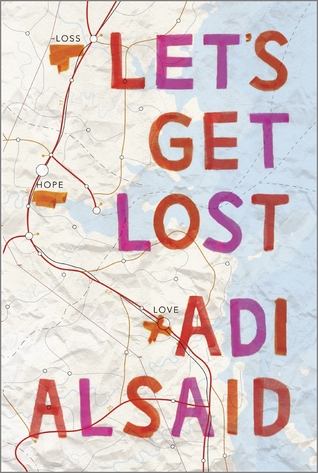Let's Get Lost by Adi Alsaid
Publisher: HarlequinTeen
Release date: July 29th 2014
Genre: Young Adult contemporary
Source: BEA 2014
Five strangers. Countless adventures.One epic way to get lost. Four teens across the country have only one thing in common: a girl named LEILA. She crashes into their lives in her absurdly red car at the moment they need someone the most. There's HUDSON, a small-town mechanic who is willing to throw away his dreams for true love. And BREE, a runaway who seizes every Tuesday—and a few stolen goods along the way. ELLIOT believes in happy endings…until his own life goes off-script. And SONIA worries that when she lost her boyfriend, she also lost the ability to love. Hudson, Bree, Elliot and Sonia find a friend in Leila. And when Leila leaves them, their lives are forever changed. But it is during Leila's own 4,268-mile journey that she discovers the most important truth— sometimes, what you need most is right where you started. And maybe the only way to find what you're looking for is to get lost along the way.
So far on this blog, I've reviewed badass feminist books I loved, and I've reviewed books I couldn't enjoy because of their problematic messages. But what do you say when you loved a book even though it has some sexist bs that would usually turn my review into a feminist rant and nothing else? That's how I feel about Let's Get Lost. I loved Adi Alsaid's writing style - it's the perfect balance of funny and poignant, making this a novel that is both entertaining and heartbreaking. But at the same time, there are storylines in Let's Get Lost that frustrated me to no end in their portrayal of gender.
The novel is separated into five parts, each focusing on a different character, and I did not enjoy them all equally. My favorite parts were Bree's and Sonia's - both of them get into ridiculous situations with Leila, and they are hilarious to read about. Underneath all of these entertaining scenes lies stellar character development for both Bree and Sonia: both of their background stories are heartbreaking and made me feel for them throughout their parts. To me, these two sections are the funniest but also convey a very strong message.
Hudson's and Elliot's sections are the two that I took issue with. I did really enjoy these parts - they, too, have great humor and poignancy - but they both have problematic themes. Hudson's story adheres a bit too closely to the manic pixie dream girl trope: Hudson is the good guy with issues, and along comes this "whirlwind of a girl" who is so different from anyone else he knows and helps him discover himself. Leila, the manic pixie dream girl (MPDG) works as a plot tool without really having a personality of her own. Looking back after I've finished the novel, and knowing what I know now about Leila, it makes sense that we wouldn't find out much about Leila, but while reading Hudson's section, the set-up didn't sit right with me, just because this trope is very problematic in terms of women's representation and it just frustrates me every time I see it.
In Elliot's story, too, my issues are gender-related. This section takes place after Elliot has confessed his love for his friend and she has turned him down, and the whole story revolves around Eliot trying, again and again, to win her over, after she has said no. It's the classic "friendzone" story, which automatically made me dislike Eliot for his sense of entitlement to women. The way he does not respect her no and continues to attempt to win her over is deeply problematic and perpetuates rape culture and ideas of male entitlement, . His behavior is simply not okay, and that made it hard for me to enjoy Elliot's story, even though his section, too, had some very entertaining parts.
The last part of the novel is about Leila, and it's another section that I loved. After finding out about Leila's background, I wanted to go back and reread everything, just to see how much better I could understand Leila's behavior now that I know what she's going through. Her story is heartbreaking but hopeful, and I loved it. The only part I took issue with is the ending, because that just seemed unnecessary and unrealistic to me. Getting to know Leila deMPDG'ed her, because she becomes her own person rather than just a plot tool. But that doesn't change the fact that, in Hudson's section, that's really her only purpose.
Writing this review makes me very glad we don't have a rating system figured out for this blog yet, because I would have no idea how to rate Let's Get Lost. It would for sure fail if I had to rate it solely on its feminist/anti-feminist qualities, but I still kind of loved it. With the perfect balance of humorous, random road trip adventures and the honest exploration of these characters' inspiring struggles, Let's Get Lost is the perfect summer read, but I still feel kind of weird about recommending it because of the sexist tropes it uses. But then again, I think we all love some sexist TV shows and music we still love, so maybe books don't have to be any different, as long as we still recognize the content is problematic... How do you feel about books (or movies, TV shows, music, etc.) that definitely go against feminist ideas but that you still kind of love anyways?


Ahhh Let's Get Lost, one of my most favorite books. Elliot was also one of my least favorite sections but my reasons were different from yours. Reading your review, I wasn't even able to guess what the rating would be. I'm glad you kinda sorta liked the book. :) Thanks for sharing!
ReplyDelete~Kaitlin